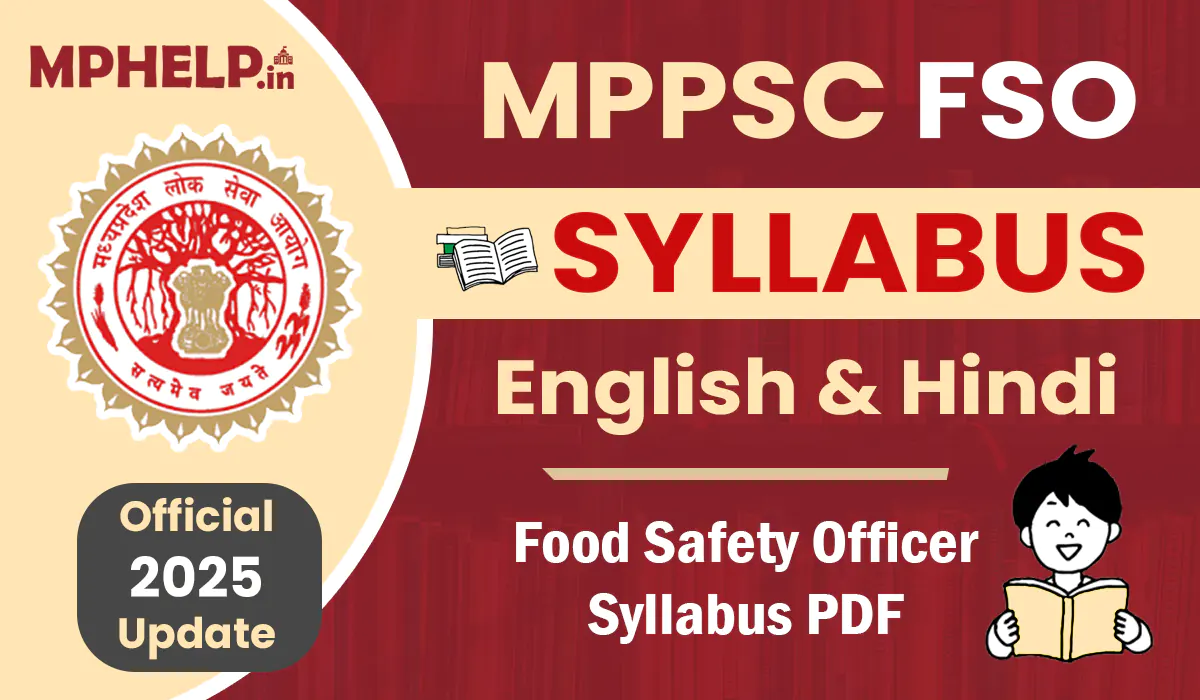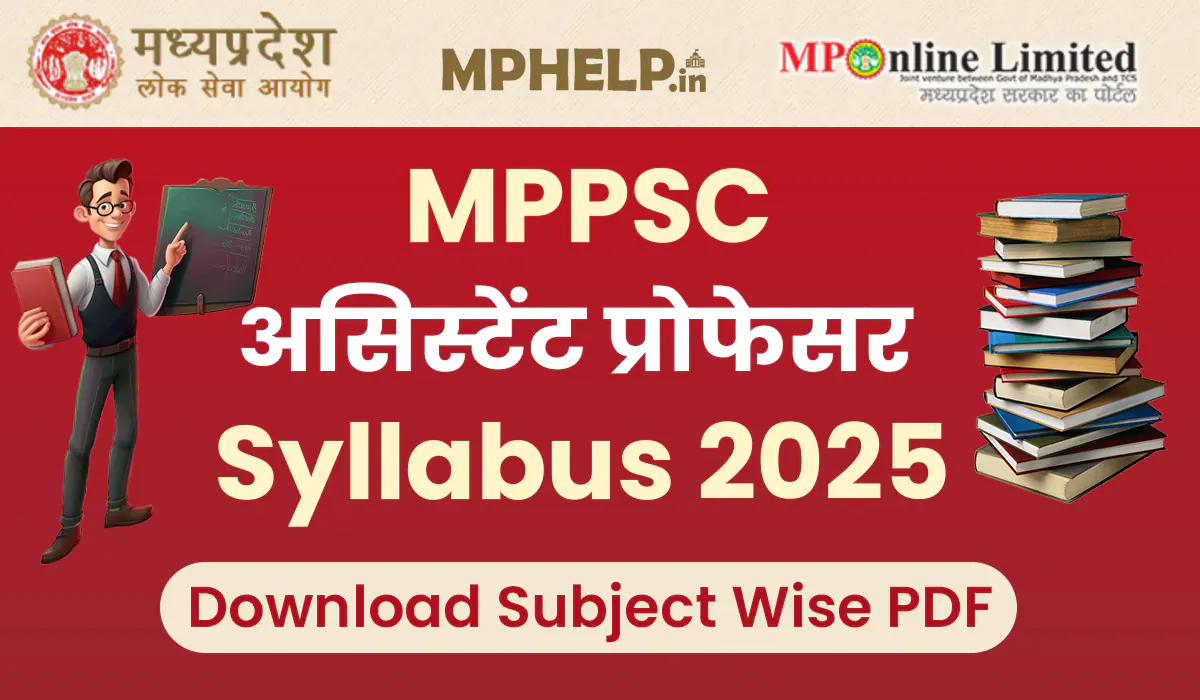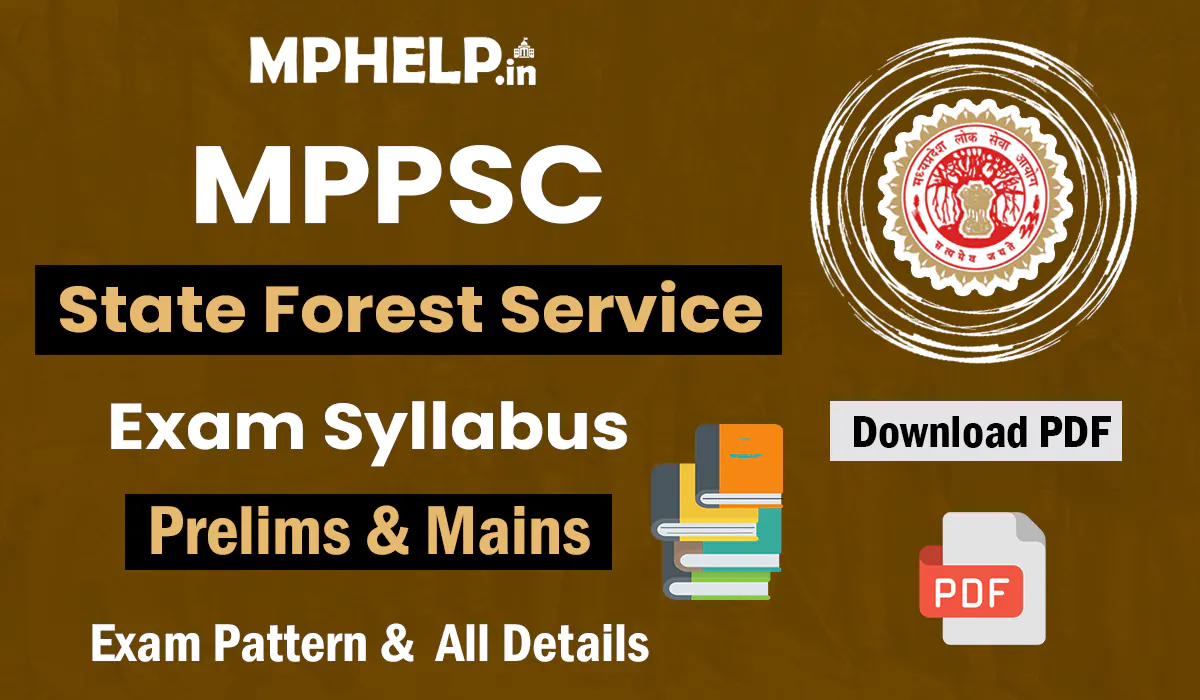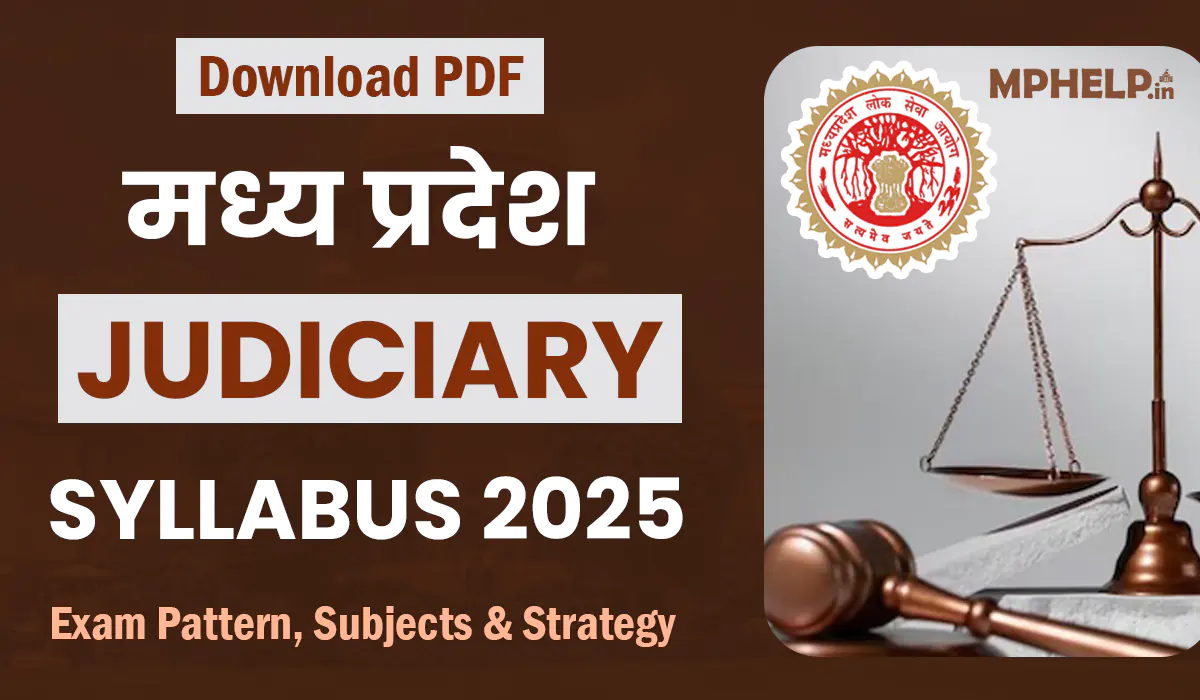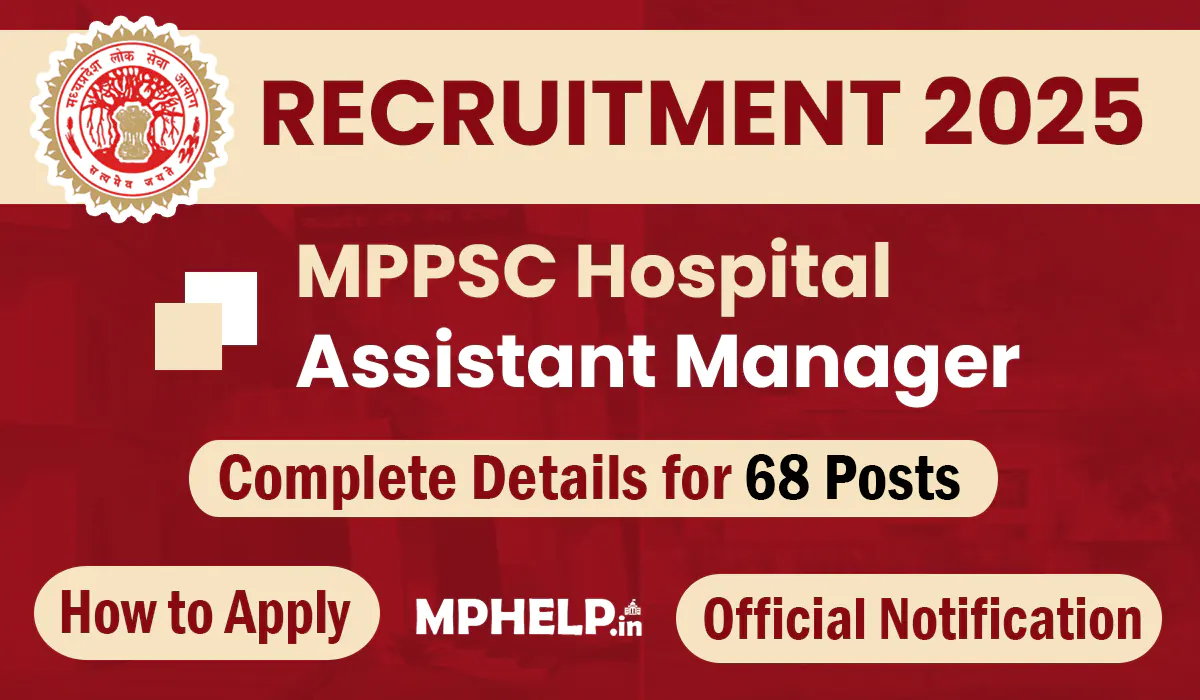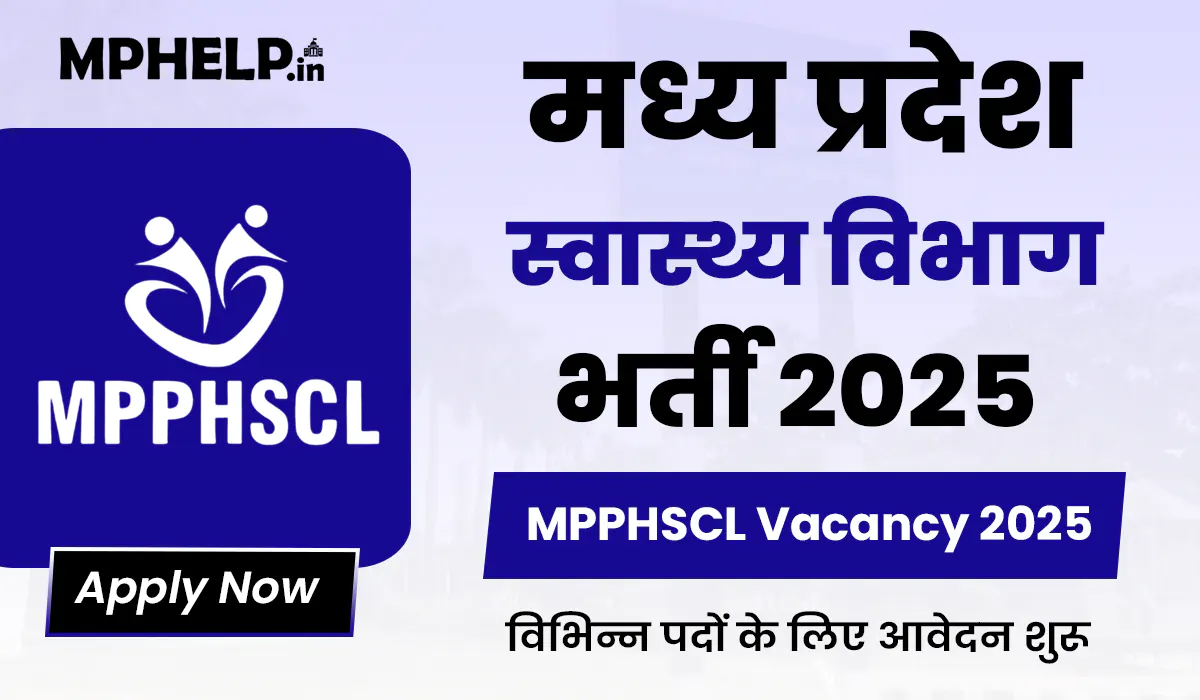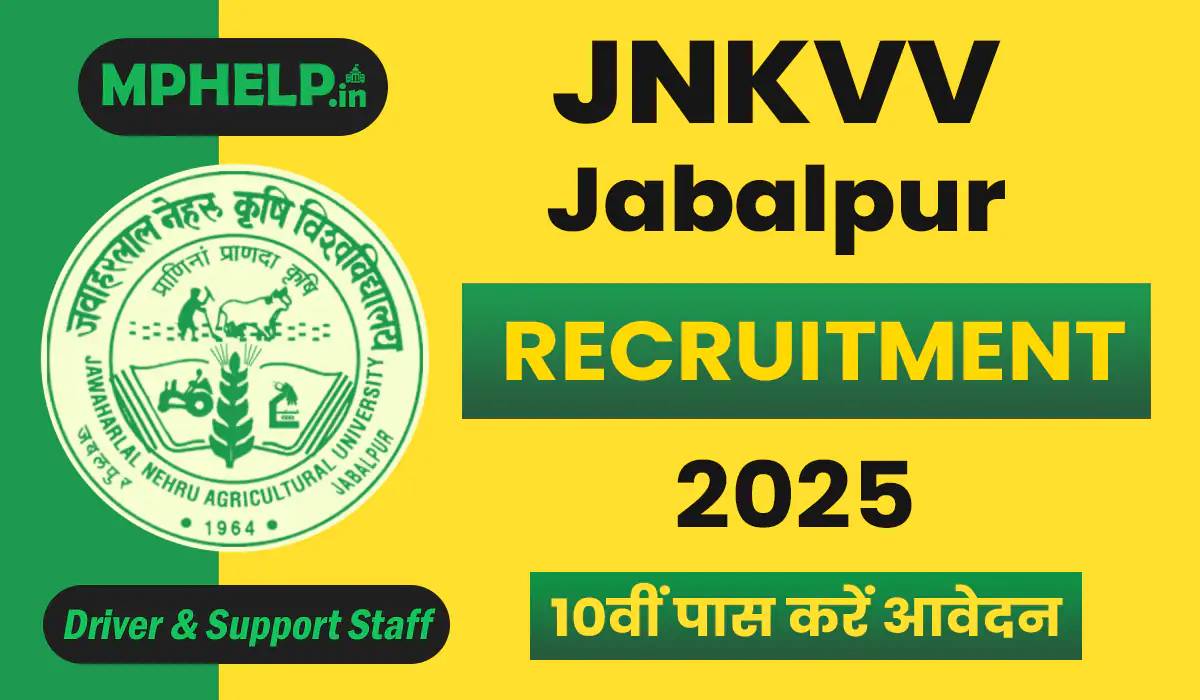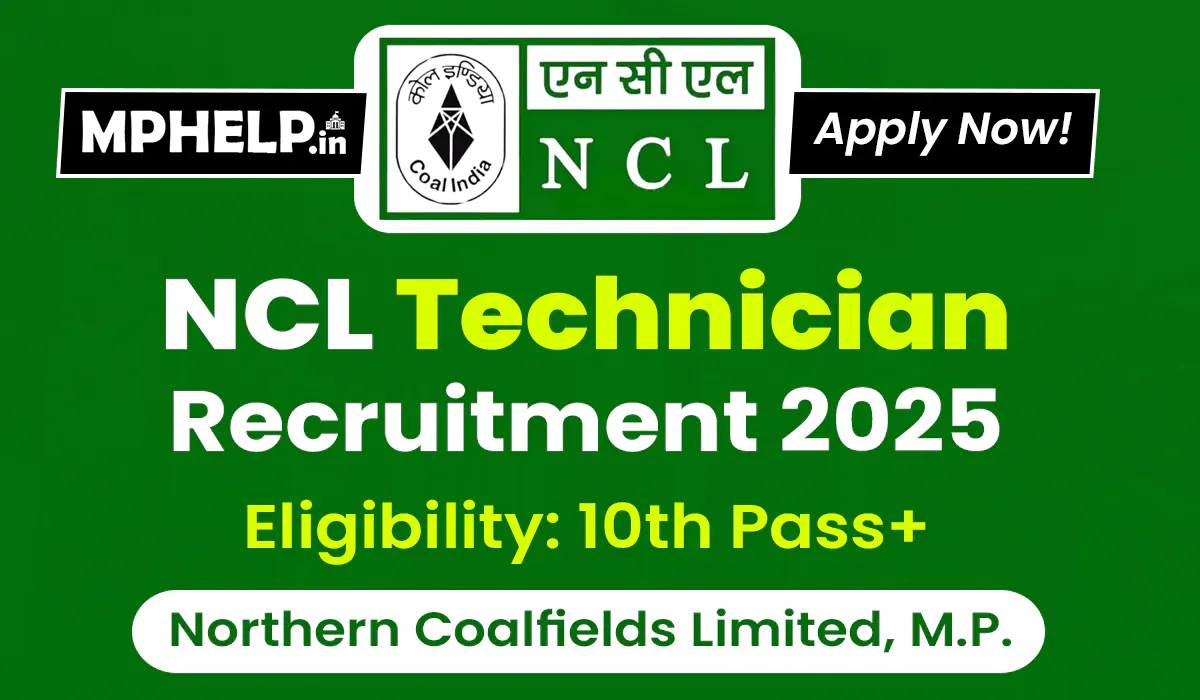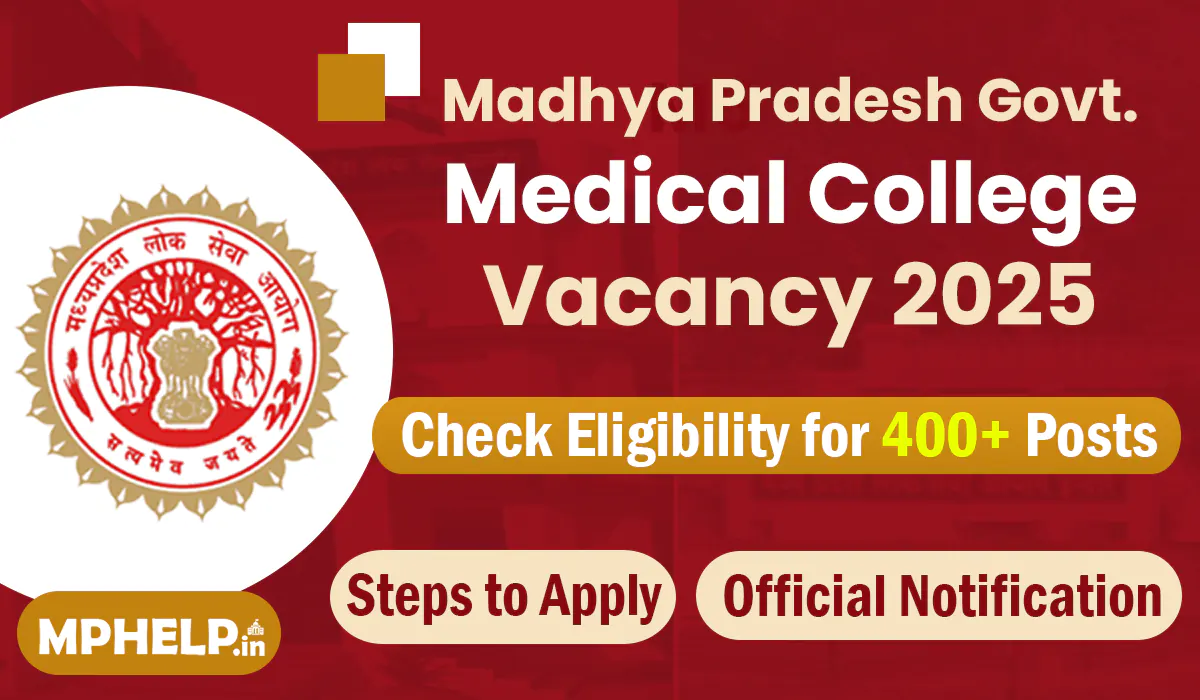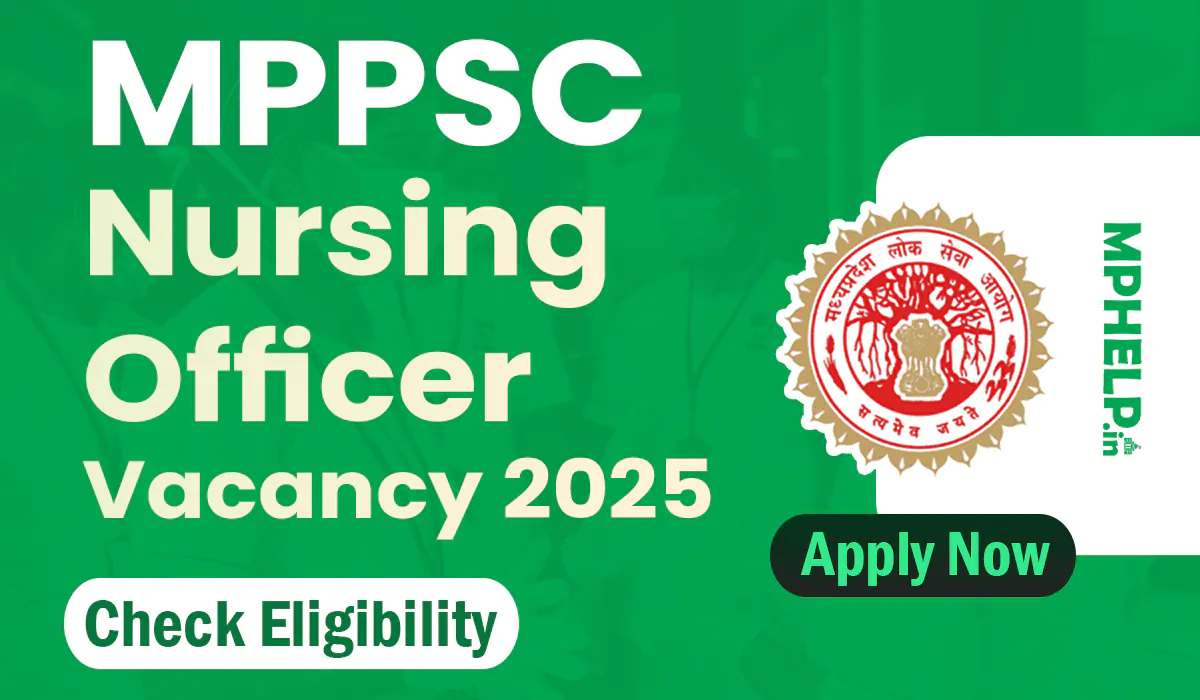MPPSC Librarian Syllabus 2025: मध्य प्रदेश लोक सेवा आयोग (MPPSC) ने लाइब्रेरियन भर्ती 2025 के लिए परीक्षा सिलेबस जारी कर दिया है। अगर आप इस परीक्षा की तैयारी कर रहे हैं, तो सही स्ट्रेटजी और सिलेबस की पूरी जानकारी आपके लिए बेहद जरूरी है। इसलिए हम आपके लिए MPPSC Librarian Exam 2025 का पूरा सिलेबस और तैयारी का प्लान लेकर आए हैं।
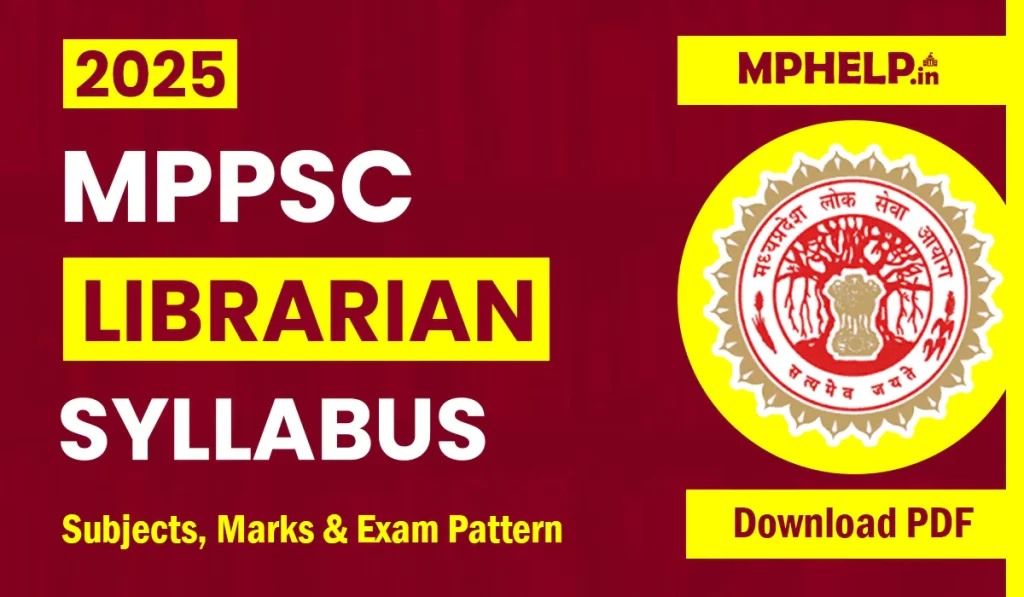
इस लेख में आपको सिलेबस, परीक्षा पैटर्न, तैयारी की रणनीति और कुछ खास टिप्स हमने दिया है। आप अछे से पढ़ लें।
MPPSC Librarian Syllabus 2025 Details
| सिलेबस का नाम | MPPSC Librarian Syllabus 2025 |
|---|---|
| परीक्षा आयोजित करने वाली संस्था | Madhya Pradesh Public Service Commission (MPPSC) |
| भर्ती का नाम | MPPSC Librarian Recruitment 2025 |
| चयन प्रक्रिया | Written Test + Interview |
| कुल मार्क | 900 (Written Test: 800 + Interview: 100) |
| परीक्षा मोड | Offline (OMR-based) |
| आधिकारिक वेबसाइट | www.mppsc.mp.gov.in |
MPPSC Librarian Exam Pattern 2025
परीक्षा पैटर्न को समझना आपकी तैयारी का पहला स्टेप है। MPPSC लाइब्रेरियन परीक्षा दो पेपर्स में आयोजित की जाएगी।
| प्रश्न पत्र | विषय | प्रश्नों की संख्या | अंक | समय |
|---|---|---|---|---|
| प्रथम प्रश्न पत्र | General Studies | 50 | 200 | 1 घंटा |
| द्वितीय प्रश्न पत्र | Library & Information Science | 150 | 600 | 3 घंटे |
| कुल योग | 200 | 800 | 4 घंटे | |
| इंटरव्यू | – | – | 100 | – |
| कुल अंक (लिखित + इंटरव्यू) | – | – | 900 | – |
Important Points to Remember
- परीक्षा OMR शीट पर होगी।
- हर प्रश्न 4 अंक का होगा
- कोई नेगेटिव मार्किंग नहीं है।
- दोनों पेपर्स में अलग-अलग 40% अंक लाना जरूरी है (SC/ST/OBC/EWS/PH के लिए 30%)।
- पेपर हिंदी और अंग्रेजी दोनों भाषाओं में होंगे।
- Paper-I (1 घंटा) – सवाल कम हैं, इसलिए स्पीड और एक्यूरेसी पर फोकस करें।
- Paper-II (150 सवाल) – टेक्निकल टॉपिक्स हैं, इसलिए प्रैक्टिकल नॉलेज मजबूत करें।
- इंटरव्यू (100 अंक) – मध्य प्रदेश के लाइब्रेरी सिस्टम्स की जानकारी बढ़ाएँ, यह अतिरिक्त स्कोर दिला सकता है।
MPPSC Librarian Syllabus 2025
यहाँ MPPSC Librarian 2025 का पूरा सिलेबस है, जो दो पेपर्स (Paper-I, Paper-II) में बँटा है।
Paper-I: General Studies Syllabus
Unit-1: History of Madhya Pradesh
- Ancient History of Madhya Pradesh: Prehistoric Period, Protohistoric Period, and Historic Period.
- Medieval History of Madhya Pradesh.
- Modern History of Madhya Pradesh.
- Freedom Movement in Madhya Pradesh.
- Tribal History and Tribal Literature of Madhya Pradesh.
Unit-2: Geography of Madhya Pradesh
- Geographical location and extent of the state, major rivers, mountains.
- Climate: Seasons, soils, temperature, rainfall, forest types, and forest produce.
- Agriculture: Major crops, sources of irrigation, irrigation projects.
- Thermal power projects, non-conventional energy sources, major minerals.
- Population size, growth, literacy; transportation, food processing industries.
Unit-3: Politics & Economy of Madhya Pradesh
- Governor, Chief Minister, Cabinet, Vidhan Sabha, High Court, Lokayukta.
- State Secretariat, Chief Secretary, Divisional Commissioner, Police Commissioner.
- District Administration, Urban Administration, Local Self Government, Panchayati Raj Institutions.
- State Election Commission, State Information Commission, State Scheduled Castes Commission, State Scheduled Tribes Commission, State Backward Classes Commission, State Commission for Women.
- Scheduled Caste and Scheduled Tribe Prevention of Atrocities Act, 1989; Panchayats Extension to Scheduled Areas (PESA) Act, 1996; Environment Protection Act, 1986; Madhya Pradesh Govansh Vadh Pratishedh Adhiniyam, 2004.
- Overview of the Economy of Madhya Pradesh.
- Status of Agriculture and Rural Development in Madhya Pradesh.
- Development of Industrial and Infrastructural Framework in Madhya Pradesh.
- Status of Education, Health, and Skill Development in Madhya Pradesh.
- Status of Madhya Pradesh in Sustainable Development Goals, Ease of Doing Business, and Multidimensional Poverty Index.
Unit-4: Tribal Culture & Literature
- Geographical spread of tribes in Madhya Pradesh, constitutional provisions related to tribes.
- Major tribes and Particularly Vulnerable Tribal Groups (PVTGs), tribal welfare programs.
- Tribal culture: Traditions, special arts, festivals, celebrations, language, dialects, and literature.
- Tribal contribution to India’s freedom struggle, iconic tribal personalities of MP, tribal institutes, museums, and publications.
- Folk culture and folk literature of Madhya Pradesh.
Unit-5: Current Affairs & Technology
- Important International and National Contemporary events.
- Important Contemporary events and Major Public Welfare Schemes of Madhya Pradesh.
- Prominent personalities and Important Places of Madhya Pradesh.
- Computers, Information & Communication Technology, E-Governance.
- Basic knowledge of Artificial Intelligence (AI), Machine Learning, Cloud Computing, Data Science, and Internet of Things.
Paper-II: Library and Information Science Syllabus
Unit-1: Information, Knowledge and Library
- Data, Information, Knowledge, and Wisdom. Knowledge Society.
- Communication: Meaning, Types, Theories, Models, and Barriers.
- Intellectual Property Rights: Copyrights, Right to Information Act, Information Technology Act.
- National Knowledge Commission (NKC), National Mission on Libraries, National Education Policy-2020.
- Role of UNESCO, UGC, and Raja Rammohun Roy Library Foundation in promoting libraries. Public Relations and Extension Activities.
Unit-2: Foundations of Library and Information Science
- Historical Development of Libraries in India, Committees and Commissions on Libraries, Library Development and Education in Madhya Pradesh.
- Types of Libraries: Functions, Objectives, and Activities. Five Laws of Library Science and their Implications.
- Library Legislation and Public Library Acts in Indian States, Delivery of Books and Newspapers (Public Libraries) Act 1954 and 1956.
- National Library Associations: ILA, IATLIS, IASLIC. International Associations: IFLA, ALA, CILIP.
- User Studies, Information Literacy, and Professional Ethics.
Unit-3: Reference and Information Sources
- Information Sources: Nature, Types, Characteristics, Evaluation of Reference, Web, Human, and Institutional Resources.
- Primary Sources: Journals, Conference Proceedings, Patents, Standards, Government Publications, Theses, Trade Literature (Print and Electronic).
- Secondary Sources: Dictionaries, Encyclopedias, Bibliographies, Indexing and Abstracting, Statistical, Handbooks, Geographical, Biographical Sources (Print and Electronic).
- Tertiary Sources: Directories, Yearbooks, Guide to Research (Print and Electronic).
- Electronic Resources and Databases: Bibliographic, Numeric, Multimedia, Full-text.
Unit-4: Reference and Information Services
- Reference Service: Definition, Types, Referral, Virtual Reference.
- CAS, SDI, Inter-Library Loan, Document Delivery, Library Websites, Apps, SMS Alerts, Ask A Librarian.
- Documentation Centre, Information Centre, Data Centre, Information Analysis Centre, Clearing Houses, Data Banks, Referral Centre, Translation Centre.
- Information Systems and Networks: National (NIScPR, DESIDOC, NASSDOC, INFLIBNET, NKN, NICNET), International (INSPEC, AGRIS, BIOSIS, INIS, MEDLARS, PIS, OCLC).
- National and International Library Resource Sharing and Consortia.
Unit-5: Knowledge Organization and Processing
- Universe of Subjects, Modes of Formation, Modes of Thinking, Mapping in CC, DDC, UDC.
- Library Classification: Theories, Canons, Principles, Postulates, Devices, Mnemonics, Five Fundamental Categories, Notation, Facet Analysis, Phase Relations, Common Isolates, Web Dewey, Taxonomies, Folksonomy.
- Library Cataloguing: CCC, AACR-II, Physical and Inner Forms, Kinds of Entries, Filing Rules, Subject Cataloguing, Sear’s List, LCSH, Normative Principles, CIP, Union Catalogues.
- Web OPACs, ISBD, CCF, RDA, FRBR, Bibframe, MARC-21, Dublin Core, ISO 2709, Z39.50.
- Indexing Systems: Pre- and Post-Coordinate, Abstracting, Information Retrieval, Vocabulary Control, Thesaurus.
Unit-6: Management of Library and Information Centres
- Management: Definition, Principles, Levels, Functions, Schools of Thought, MIS, MBO, Change Management, Disaster Management, Crisis Management.
- HRM: Job Description, Staff Formulas, Selection, Motivation, Training, Job Evaluation, Leadership, TQM, SWOT Analysis, Staff Manual.
- Book Selection Policies, Binding, Preservation, Marketing, ISBN, ISSN.
- Financial Management: Sources, Mobilization, Estimation, Budgeting, Cost Analysis, Library Authority, Rules, Annual Report, Statistics.
- Functional Units: Acquisition, Technical, Circulation, Periodical, Maintenance Sections, Stock Verification, Library Building, Green Libraries, Knowledge Management.
Unit-7: Computer and Information Technology
- Computer: Characteristics, Components (CPU, I/O Devices, Storage).
- Hardware, Software, OS (Windows, Unix, Linux), Programming Languages, MS Office (Word, Excel, PowerPoint, Access).
- Networks: Topologies, Types, Transmission Channels, ISDN, Modulation, Bandwidth, Protocols, Wireless, Mobile Communication, Videotext, Voice Mail.
- Internet: WWW, Search Engines, Protocols (HTTP, FTP, SMTP, TCP/IP), URL, Search Strategies.
- Data Security: Firewalls, Cryptography, Antivirus Software.
Unit-8: Library Automation and Digital Library
- Library Automation: Definition, Need, Purpose, Advantages, Hardware/Software Selection.
- Automation of Operations: Acquisition, Cataloguing, OPACs, Circulation, Serial Control, Barcode, RFID, QR Code, Biometric Tech.
- Database Creation: CDS/ISIS, WINISIS, Library Software (Koha, Libsys, SOUL, E-Granthalaya), Standards.
- Digital Library: Genesis, Characteristics, Types, Standards, Protocols, Preservation, Software (Greenstone, Dspace).
- Institutional Repositories, CMS, AI, Expert Systems, Cloud Computing, Ontology, Semantic Web, Big Data, Data Mining.
Unit-9: Research Methods
- Research: Meaning, Types, Problem Selection, Literature Review, Hypotheses, Design, Sampling Techniques.
- Quantitative and Qualitative Methods: Historical, Descriptive, Survey, Experimental, Case Study, Grounded Theory, Hermeneutics.
- Data Collection: Interview, Questionnaire, Observation, Schedule, Library Records.
- Data Analysis: Graphical, Statistical (Spreadsheet, SPSS), Research Ethics, Academic Integrity.
- Technical Writing, Research Reports, Citation Tools, Style Manuals, Plagiarism, Bibliometrics, Webometrics, Scientometrics, Citation Analysis, Impact Factors (h-Index, g-Index), LIS Research Trends.
Unit-10: Library and Information Systems
- Academic, Public, and Special Library Systems.
- Health Library and Information System.
- Agricultural, Engineering, and Technological Library Systems.
- Services for Persons with Disability, Community Information Systems.
- Archives, Museums, and Oriental Libraries of Madhya Pradesh.
इस पूरी सिलेबस का PDF हमने आपके लिए तैयार किया है। आप नीचे दी गई लिंक से MPPSC Librarian Syllabus 2025 PDF डाउनलोड कर सकते हैं।
Paper I Syllabus PDF (Hindi & English) – Download
Paper II Syllabus PDF (Hindi & English) – Download
Preparation Strategy & Tips
मेरी दोस्त प्रिया आज मध्य प्रदेश में एक सफल लाइब्रेरियन हैं। उसने कम समय में MPPSC Librarian Exam के लिए अपनी तयारी पूरी की थी। जब मैंने उसे पूछा कि अपनी तयारी में क्या खास था तो उसने अपनी स्ट्रेटजी शेयर करते हुए कहा की
“सिलेबस को रटने से ज्यादा, इसके पीछे की समझ बनाओ – लाइब्रेरी साइंस प्रैक्टिकल फील्ड है।”
यहाँ नीचे हमारे तरफ से कुछ स्मार्ट टिप्स देने की हमने कोशिश की है।
पढ़ाई का टाइमटेबल सही प्लान करो
- 10 दिन का टेक्निकल फोकस: Library Automation, Digital Library, और Knowledge Organization जैसे कोर टॉपिक्स को 10 दिन में मास्टर करो – ये Paper-II के 600 मार्क्स का बेस हैं।
- 5 दिन MP पर नज़र: History, Geography, और Tribal Culture को 5 दिन में MP के कॉन्टेक्स्ट के साथ कवर करो – इससे याद रखना आसान होगा।
- हर 3 दिन में टॉपिक्स चेंज करो – पहला दिन टेक्नोलॉजी, दूसरा MP स्टडीज़, तीसरा रिसर्च मेथड्स, इससे फोकस बना रहेगा।
मॉक टेस्ट से प्रैक्टिस को परफेक्ट करो
- Paper-I के 50 सवालों को 50 मिनट में हल करो, आखिरी 10 मिनट रिवीजन के लिए रखो। स्पीड और एक्यूरेसी पक्की होगी।
- Paper-II के 150 सवालों को 2.5 घंटे में पूरा करो, फिर 30 मिनट में कमज़ोर पॉइंट्स पकड़ो।
- mppsc.mp.gov.in से पुराने पेपर्स डाउनलोड करो और पैटर्न को अच्छे से समझो।
MP की लाइब्रेरी सिस्टम को समझो
- MP के आर्काइव्स (Archives), म्यूज़ियम्स, और ओरिएंटल लाइब्रेरीज़, जैसे भोपाल का ट्राइबल म्यूज़ियम की डिटेल्स स्टडी करो।
- मध्य प्रदेश में लाइब्रेरी से जुड़े नए प्रोजेक्ट्स, जैसे की डिजिटल इनिशिएटिव्स को फॉलो करो। करंट अफेयर्स में फ़ाइदा मिलेगी।
विज़ुअल टूल्स से पढ़ाई को आसान बनाओ
- सिलेबस को माइंड मैप्स में ढालो, Five Laws को चार्ट पर लिखकर दीवार पर लगाओ।
- फ्लैशकार्ड सिस्टम- MARC-21, RDA, या MP के ट्राइबल ग्रुप्स जैसे टॉपिक्स को फ्लैशकार्ड्स पर तैयार करो, क्विक रिवीजन के लिए बेस्ट है।
टेक्नोलॉजी में एक्सपर्ट बनो
- Koha या Dspace जैसे सॉफ्टवेयर को ऑनलाइन ट्यूटोरियल्स से सीखो, हाथ से काम करके कॉन्सेप्ट क्लियर होंगे।
- AI, Cloud Computing, और Big Data की बेसिक समझ ऑनलाइन प्लेटफॉर्म्स से बनाओ, सिलेबस का ये हिस्सा आसान लगेगा।
करंट अफेयर्स को मज़बूत रखो
- लाइब्रेरी से जुड़े प्रोजेक्ट्स, जैसेकी NKN या INFLIBNET अपडेट्स को ट्रैक करो, पेपर और इंटरव्यू में फायदा होगा।
- MP न्यूज़ ऐप्स और PIB से हर सुबह 10 मिनट अपडेट्स चेक करो, हमेशा तैयार रहो।
दिमाग को बैलेंस में रखो
- दिन में 4 टॉपिक्स पर 4 घंटे फोकस करो। बाकी टाइम रेस्ट या रिवीजन के लिए यूज़ करो, प्रोडक्टिविटी बढ़ेगी।
- हर 50 मिनट पढ़ाई के बाद 10 मिनट का ब्रेक लो। दिमाग फ्रेश रहेगा।
ग्रुप स्टडी से फायदा उठाओ
- दोस्तों के साथ MP की ट्राइबल हिस्ट्री या लाइब्रेरी ऑटोमेशन पर स्ट्रक्चर्ड बातचीत करो, कॉन्सेप्ट्स मज़बूत होंगे।
- हफ्ते में ग्रुप के साथ 20-20 सवालों का क्विज़ करो, सीखना आसान और इंटरेस्टिंग हो जाएगा।
डिसिप्लिन, स्ट्रेटजिक प्लानिंग, और लगातार मेहनत से आप MPPSC Librarian 2025 Syllabus अछे से कंप्लीट कर सकते हो। तो आज से ही शुरू करो।
